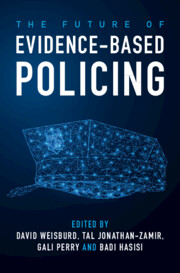Book contents
- The Future of Evidence-Based Policing
- The Future of Evidence-Based Policing
- Copyright page
- Contents
- Figures
- Tables
- Contributors
- Editors
- 1 The Future of Evidence-Based Policing
- Part I Taking Stock of Evidence-Based Policing
- 2 Three Tiers for Evidence-Based Policing
- 3 Re-inventing Policing
- 4 A Way Ahead
- Part II The Evidence for Evidence-Based Policing
- Part III Innovations in Tools of Evaluation and Assessment
- Part IV Challenges to the Implementation of Evidence-Based Policing
- Part V The Practitioner’s Perspective
- 17 Conclusions
- Index
- References
4 - A Way Ahead
Re-envisioning the Relationship between Evidence-Based Policing and the Police Craft
from Part I - Taking Stock of Evidence-Based Policing
Published online by Cambridge University Press: 01 June 2023
- The Future of Evidence-Based Policing
- The Future of Evidence-Based Policing
- Copyright page
- Contents
- Figures
- Tables
- Contributors
- Editors
- 1 The Future of Evidence-Based Policing
- Part I Taking Stock of Evidence-Based Policing
- 2 Three Tiers for Evidence-Based Policing
- 3 Re-inventing Policing
- 4 A Way Ahead
- Part II The Evidence for Evidence-Based Policing
- Part III Innovations in Tools of Evaluation and Assessment
- Part IV Challenges to the Implementation of Evidence-Based Policing
- Part V The Practitioner’s Perspective
- 17 Conclusions
- Index
- References
Summary
Evidence-based policing (EBP) is perhaps the most significant police reform movement of the last 30 years. Most notable for identifying what does or does not work, and for trying to integrate science into policing, much of EBP’s focus remains on program evaluation methods and investigating crime prevention strategies. This vision for policing often characterizes the craft of police work as an obstacle rather than a useful contributor to science. This is changing, as proponents of EBP begin to embrace a wider variety of methods to assess a broader range of outcomes, and to treat both science and experience as necessary elements of successful police reform. In this chapter, we recommend that EBP focus more attention on assessing the choices that patrol officers make in their everyday encounters with the public. Drawing on a case study of a neighbor dispute, we show how EBP could benefit from listening to practioners and learning what their rich experiences have taught them about how best to respond. We also suggest ways that research might help generate knowledge on the essential normative or moral questions that characterize street-level discretion, and thus combine knowledge about what works with knowledge about doing the right thing.
Keywords
- Type
- Chapter
- Information
- The Future of Evidence-Based Policing , pp. 64 - 82Publisher: Cambridge University PressPrint publication year: 2023
References
- 1
- Cited by

